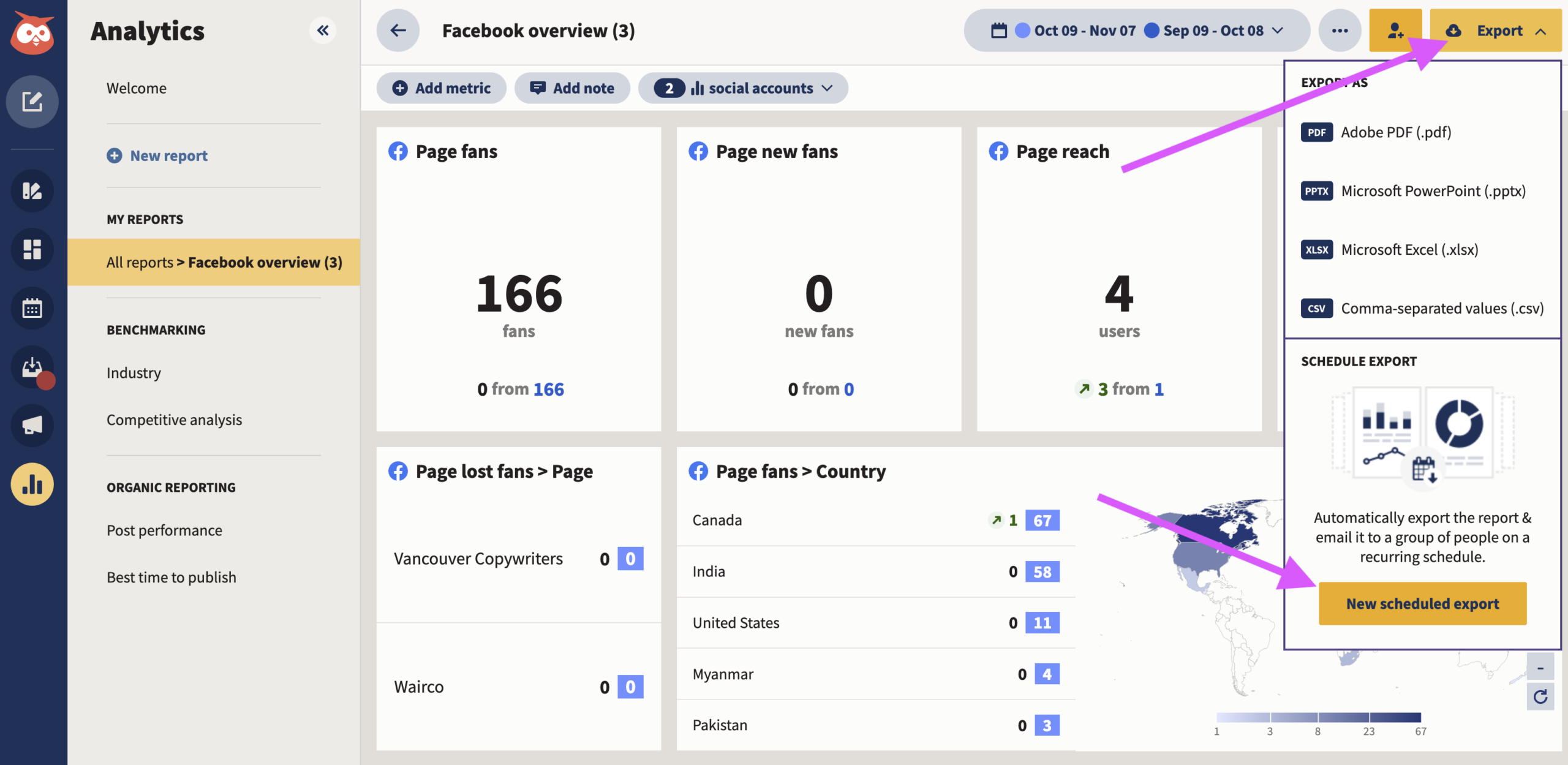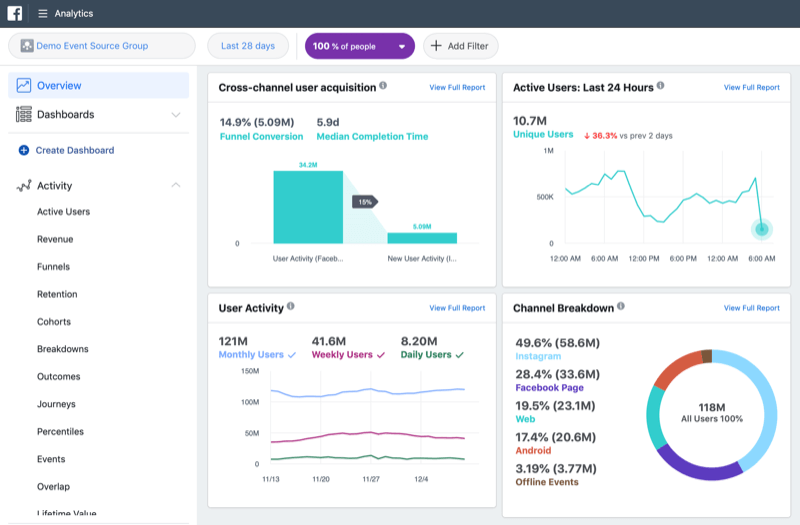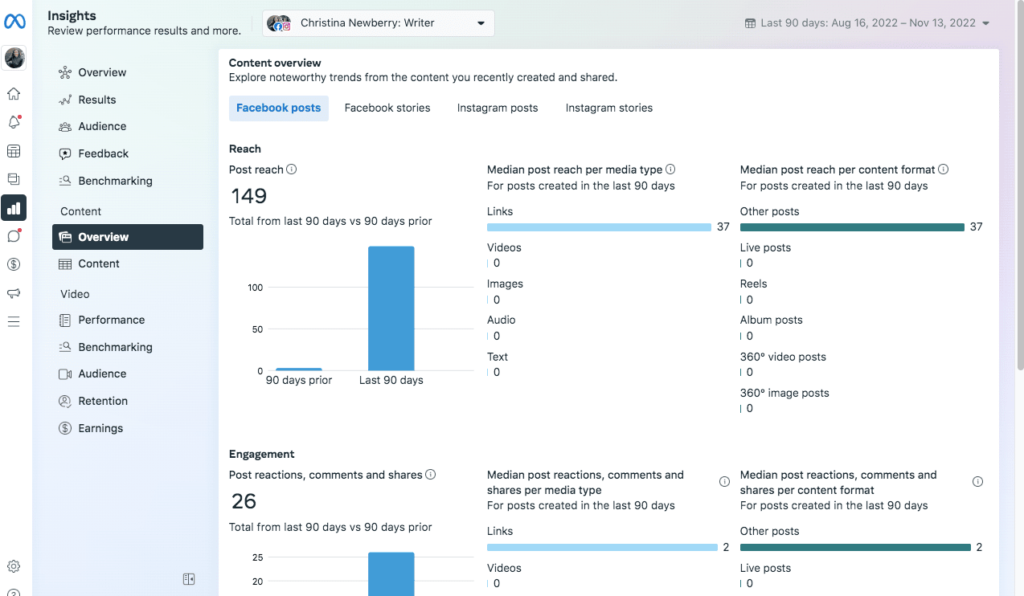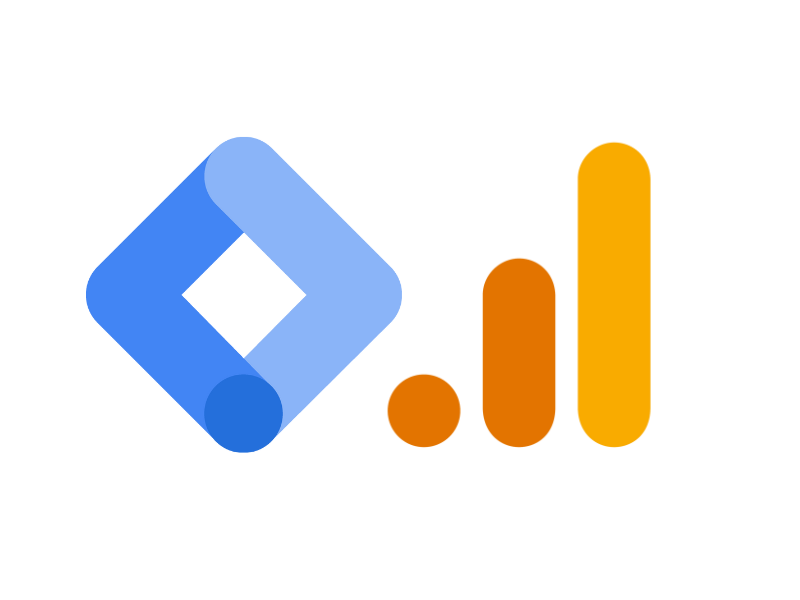Facebook Analytics is no longer available after June 30, 2021. Users must now find alternative tools for tracking social media metrics.
Facebook Analytics was a powerful tool that provided insights into user interactions with a business page on Facebook. It helped marketers understand their audience by analyzing behaviors and demographics. With features that tracked user activities across the platform and aggregated data for easy interpretation, the service was indispensable for informed decision-making on content and ad strategies.
Businesses rely on this data to optimize their social media presence, boost engagement, and measure the effectiveness of their advertising campaigns. Despite its discontinuation, the need for in-depth analysis of social media performance remains, prompting users to turn to other analytics tools offered by Facebook, like Facebook Business Suite, Ads Manager, and Events Manager, as well as third-party applications.
The Advent Of Facebook Analytics
Understanding your audience is vital to the success of any business on social media. Facebook Analytics emerged as a powerful tool. It provided valuable insights into user interactions. Businesses could tailor their strategies for better engagement. With this tool, companies began to transform their social media presence through data-driven decisions.
Early Days: Measuring Social Engagement
When Facebook Analytics first appeared, the focus was on basic metrics. Likes, shares, and comments were crucial. Companies looked at these numbers to gauge the success of their content. Engagement rates became a benchmark for social performance. Here are some metrics tracked:
- Page Likes: Total and new likes on a page.
- Post Reach: How many users saw a post.
- Engagement: Likes, comments, and shares per post.
Platform Evolution: Integration Of Business Tools
Facebook Analytics evolved quickly. It became more than just likes and comments. The platform integrated business tools for comprehensive analysis. It provided in-depth insights. Businesses could understand who their customers were. They could also learn how they interacted with content across multiple channels.
Features such as funnels, cohort analysis, and customer journeys became available. These allowed businesses to track conversions and optimize their strategies. The table below highlights some integrated tools:
| Tool | Description |
|---|---|
| Ad Manager | Manage and track advertising campaigns. |
| Pixel | Monitor user behavior on a website. |
| Insights | Get detailed data on page and post-performance. |
These tools empower businesses with the capability to measure return on investment (ROI) and refine targeting strategies to reach their ideal audience.

Credit: blog.hootsuite.com
Key Features Of Facebook Analytics
Want to grow your business on Facebook? Understand user activity on your page. Dive into Facebook Analytics. Check out key features.
User Insights: Demographics And Behavior Patterns
User Insights shine a light on who interacts with your page. See age, gender, and location.
- See age groups.
- Know top countries.
- Learn when users visit.
Track how users behave. See likes, comments, shares. Tune your content to what works.
Funnels And Journeys: Tracking User Actions
With Funnels, see the steps users take. Do they see your post and buy? Or stop halfway?
- Build custom funnels.
- Understand user actions.
- Improve the user journey.
A user journey looks at the whole path. From the first visit to the final action. Make these paths smoother.
Custom Dashboards: Tailoring Data Presentation
Create Custom Dashboards. Make your analytics fit your needs. Check the data that matters to you.
| Feature | Benefit |
|---|---|
| Select Metrics | See important numbers at a glance. |
| Drag and Drop | Arrange info as you like. |
| Save and Share | Keep teams in the loop. |
Use widgets and graphs. Show trends and compare performance. Make data-driven decisions with ease.
Practical Applications For Businesses
In today’s digital age, harnessing the power of Facebook Analytics is crucial for businesses aiming to thrive online. This platform provides valuable insights that help companies understand their audience, tweak their marketing strategies, and boost their return on investment. Below are practical applications of Facebook Analytics that empower businesses to excel in a competitive marketplace.
Audience Targeting: Reaching The Right Users
Facebook Analytics offers tools to segment audiences based on behavior, demographics, and interests. Understanding these metrics is pivotal for creating targeted ads. Here are ways companies use this data:
- Demographic Analysis: It pinpoints age, gender, and location to tailor content.
- Interest Tracking: Identifies user interests to align product marketing.
- Behavioral Insights: Understands browsing habits to refine ad timing.
Campaign Optimization: Improving Ad Performance
Facebook Analytics excels in optimizing ad campaigns for better outcomes. It achieves this through:
- Performance Metrics: Tracks clicks, impressions, and engagements.
- A/B Testing: Offers side-by-side comparisons of ad versions for efficiency.
- Ad Adjustment: Allows real-time edits based on data to improve impact.
Conversion Tracking: Measuring Roi
ROI is critical for business success. Facebook Analytics aids in tracking conversions from ad interactions. This way, businesses measure the effectiveness of their expenditures on ads. Key aspects include:
| Feature | Benefit |
|---|---|
| Purchase Tracking | Links ad views to sales for the clear ROI calculation. |
| Funnel Analysis | Identifies drop-off points to optimize the sales journey. |
| Custom Conversions | Tracks specific actions within the website. |

Credit: www.socialmediaexaminer.com
Analyzing User Interaction
Knowing how users interact with your Facebook page is key. This insight can help you tailor your content. Let’s dive into user interaction with Facebook Analytics.
Page Metrics: Understanding Engagement
Engagement rate shows how much users interact with your page. To boost this, consider these metrics:
- Page Views: Count of page visits.
- Likes: Number of new likes.
- Reach: How many saw your page’s content.
Analyze trends. Look at the days and times. See when users are most active.
Post Analytics: Determining Content Reach
Checking post reach helps you understand content performance. It answers, “Did people see my post?” Break it down like this:
| Impressions | Engaged Users |
|---|---|
| How often a post was seen | Number who interacted |
Post-reach influences future content. It shows what works.
Event Tracking: Gauging Interest And Participation
Facebook events can attract attention. Track these to measure success:
- Responses: Tally of ‘Interested’ or ‘Going’.
- Shares: How often the event was shared?
- Posts: User posts on the event’s page.
Active events have higher interest. Aim for this with your events.
Challenges And Limitations
As we navigate the vast world of Facebook Analytics, we encounter several challenges and limitations that can impact our understanding and decision-making process. These obstacles can affect how we collect, interpret, and utilize data for our business strategies. Let’s delve deeper into the most pressing issues that analysts and marketers face in this realm.
Data Privacy Concerns: Navigating Regulations
Data privacy tops the list of concerns for users and businesses alike. With evolving regulations like GDPR and CCPA, adapting to these rules is challenging. Here are key points to consider:
- User consent is necessary for data collection.
- Ensuring data security is now a legal obligation.
- Businesses must be transparent about their data usage.
Accuracy Issues: Dealing With Ambiguous Metrics
Facebook Analytics often presents metrics that are not always clear-cut. Interpreting these can be tricky, leading to potential accuracy issues. Points to note include:
| Metric | Challenge |
|---|---|
| Engagement | Defining what constitutes true engagement can vary. |
| Reach | Overlap between organic and paid reach can skew numbers. |
Cross-platform Tracking: A Quest For Cohesion
With users accessing Facebook across multiple devices, cross-platform tracking has become essential but also more complex. Highlighting several points:
- Consistency in data across devices is hard to maintain.
- Linking user interactions to a single user ID challenges data cohesion.
- Understanding the complete user journey is often complicated.
The Future Of Facebook Analytics
Facebook Analytics has been a crucial tool for marketers. The future seems vibrant and promising. Businesses will use deeper insights to drive decisions. Here’s how the landscape is shaping up.
Predictive Analytics: Anticipating User Trends
Predictive analytics will revolutionize how companies engage with audiences. By examining past behaviors, Facebook will help predict future actions.
- User engagement levels can be forecasted with precision.
- Content performance will be easier to gauge ahead of time.
- Marketing strategies can be tailored effectively, by leveraging these insights.
Integration With AI: Enhanced Analytical Capabilities
Facebook Analytics will integrate with AI, boosting its analytical powers. This will allow for:
- Real-time data interpretation, swiftly identifying trends.
- Automated insights, reducing manual analysis.
- Personalized user experiences, improving engagement.
Competitive Landscape: Emerging Alternatives
New platforms are offering analytics services.
This table compares Facebook’s features with competitors.
| Platform | Real-time Data | User Predictions | AI Integration |
|---|---|---|---|
| Facebook Analytics | Yes | Yes | Yes |
| Competitor A | Limited | No | Some |
| Competitor B | No | Yes | No |

Credit: sproutsocial.com
Frequently Asked Questions On Facebook Analytics
How Do I See My Facebook Analytics?
To view your Facebook Analytics, go to the Facebook Analytics page. Sign in, and select the relevant page or app. Access detailed usage data through the dashboard provided.
How Do I See Facebook Ad Analytics?
Access Facebook Ad Analytics by navigating to your Ads Manager. There, select the campaign you wish to analyze, and view detailed performance metrics on the dashboard provided.
Is Facebook Analytics Still Available?
No, Facebook Analytics was discontinued on June 30, 2021. Users now utilize other tools like Facebook Business Suite and Ads Manager for insights.
What Is The Name Of Facebook’s Analytics Tool?
Facebook’s analytics tool is known as “Meta Business Suite” (formerly known as Facebook Analytics). This tool allows businesses to track engagement and performance across Facebook and Instagram.
Conclusion
Navigating Facebook Analytics effectively transforms data into action. This powerful tool sheds light on user behavior, optimizing your social strategy accurately. Embrace these insights to refine content, enhance engagement, and ultimately drive success. Remember, the key to digital growth lies in understanding your audience deeply.
Harness this knowledge, and watch your online presence flourish.




